This year, we did something we once swore we’d never do. We went on an all-inclusive holiday.
And then… we went on another one.
Call it late-stage parenting burnout, call it demand avoidance in a tropical wrapper, call it the seductive pull of not having to cook or plan or pack snacks, but that’s where we found ourselves. Poolside. Buffet-hopping. Doing that slightly anxious-but-thrilled scan of the dessert trays. And yes, surrounded by tourists who still clap when planes land.
And somehow? We loved parts of it. To be clear, we were the kind of people who used to roll our eyes at all-inclusives. They felt like something other people did. People with matching family swimwear, people who don’t need to lie in a dark room after one group brunch, people who think fun can be pre-scheduled and laminated.
But the twist? It turns out we might be those people… or at least we can be, if the place lets us opt out without falling apart.
Two Holidays, Same Setup: Completely Different Nervous Systems
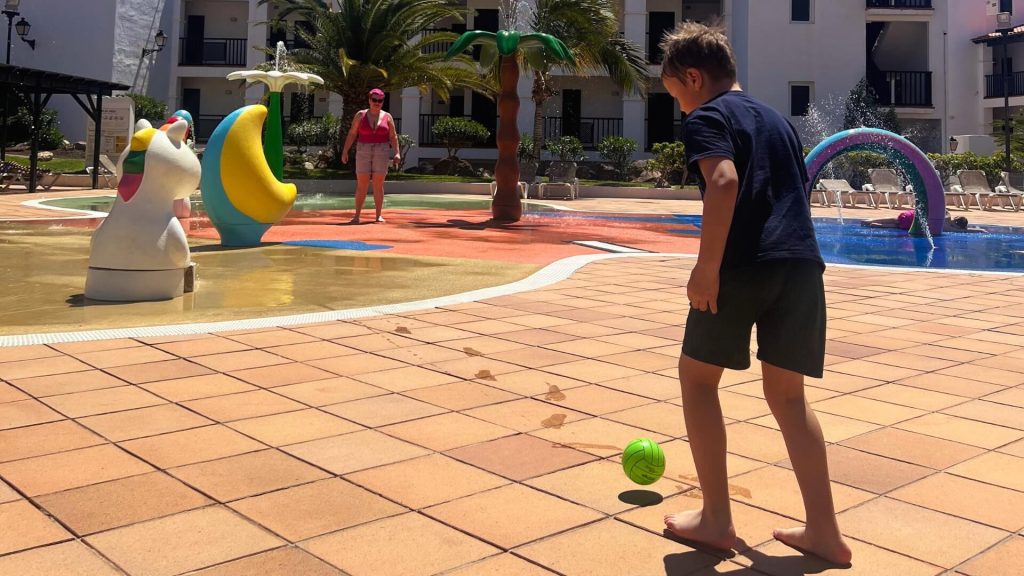
Our first trip, to Fuerteventura in April, was very much a backup plan. We’d had a long-dreamed-of trip to New York booked for Luke’s 40th, and it fell through thanks to US border stress and a growing awareness that dragging our PDA-autistic child through immigration queues might not be the empowering cultural adventure we’d hoped for.
So we re-routed. We booked Fuerteventura last minute. We didn’t overthink it. And somehow, it worked. It wasn’t fancy, but it gave us exactly what we needed: warmth, space, ease, and nobody asking us to join in anything.
Riding the high from that surprisingly great experience, we booked a second holiday in August, this time to Cyprus. Another all-inclusive. Same travel company. Same promise of no cooking and endless pool access. This time we picked it more intentionally, aiming for better slides, better weather, better everything.
We thought we knew what we were doing. Turns out, we didn’t.
Ease Is Not The Same As Inclusion
On paper, both holidays ticked the same boxes: no cooking, no cleaning, minimal planning, all the food, all the pools.
But what we quickly realised is that what’s marketed as “ease” for most people often just looks like a new version of overload for us.
In Fuerteventura:
It worked because it gave us room to breathe. The layout of the hotel meant there was space between things. You could be in the middle of the resort and still feel like you had privacy. The sea view from our balcony made us both cry when we arrived. There were no activity reps pushing us into water aerobics. No bracelets announcing your access level. It felt like we could just be there, on our terms.
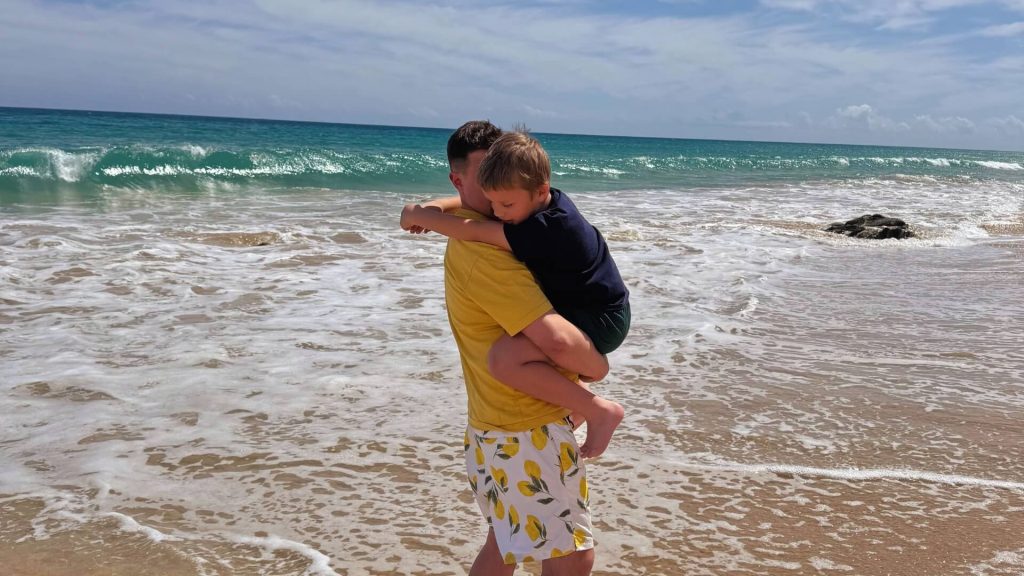
Cyprus:
…not so much. It looked more polished in the photos, but in real life it felt like a shopping centre on the last Saturday before Christmas, just with more chlorine. There was loud entertainment every night directly outside our balcony. Staff seemed either totally burnt out or robotic. We weren’t asked if we wanted the bracelets: they were clipped on and mandatory. And when we asked for a late checkout, we were first refused, then charged €110 after a small meltdown at the front desk.
The rooms were fine. The food was fine. But there was no softness. No quiet. No sense that opting out was an option.
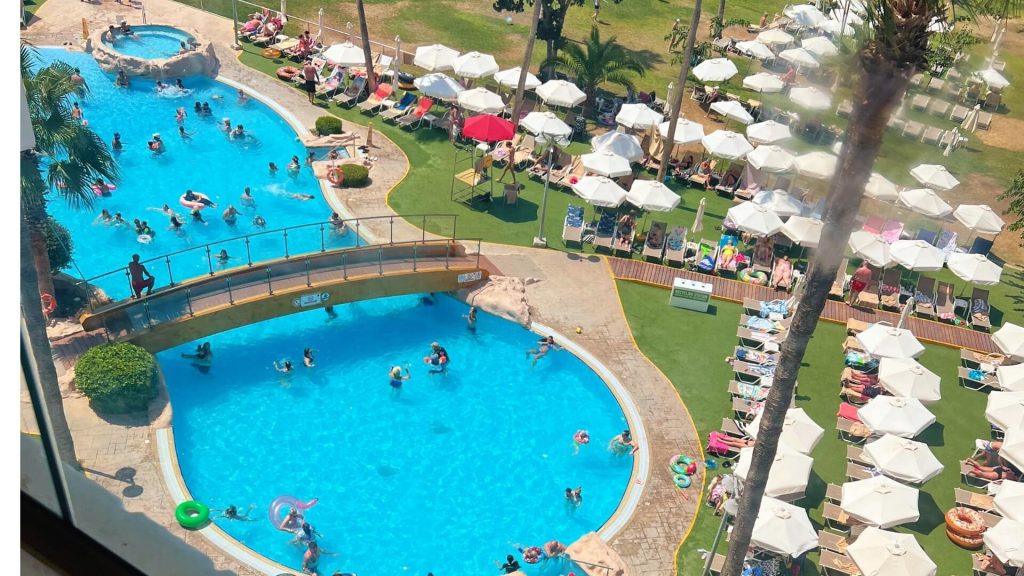
When Entertainment Feels Like Surveillance
None of us do well with “forced fun.” We don’t do hotel entertainment. Or kids clubs. Or any schedule that assumes our child can enter a new environment and just adapt immediately.
Leon, our brilliant, demand-avoidant, high-intensity kid, doesn’t do group activities unless he’s calling the shots. And we’re not exactly joiners ourselves.
So we did what we usually do:
We hung out in the room (screens on).
We found the quietest pool.
We avoided the itinerary like it was contagious.
And still, some of the best moments we’ve had as a family happened on those trips, just not in the places the resort brochure would’ve told you to look.

The Magic Happened When We Let Go of the Plan
In Fuerteventura, we tried to do what we used to do on holidays before parenting. We booked a day trip to a water park, which turned out to be an absolute disaster. The water was salty, Leon melted down, and we left after less than an hour (having spent more than 100 euros already… ND tax anyone?!)
But on the drive back, we stumbled upon giant sand dunes. Leon, who has, for years, insisted he hates sand, bolted into them. He rolled. He laughed. He directed us all in a pretend action movie. And in that moment, something in us softened.
We saw his demand avoidance for what it really is, not defiance, not sensory defensiveness, but the deep need for autonomy and emotional safety.
In Cyprus, the overwhelm built quickly. On day four, we cracked and rented a car. (Ola had to learn how to drive an automatic on the spot. No pressure.) And we impulsively booked a speedboat.
At first, it was a total failure. Wind. Salt. Splashing. Complaining. But then we stopped trying to fix it. We just… let go.
Leon got to drive. He screamed with delight. We sped up. We found a hidden cove. I got to swim alone for a few minutes. He called it a “core memory.”
We also visited a cat sanctuary. A shipwreck. We had one day that felt like a small miracle.
And it all came from abandoning the plan.
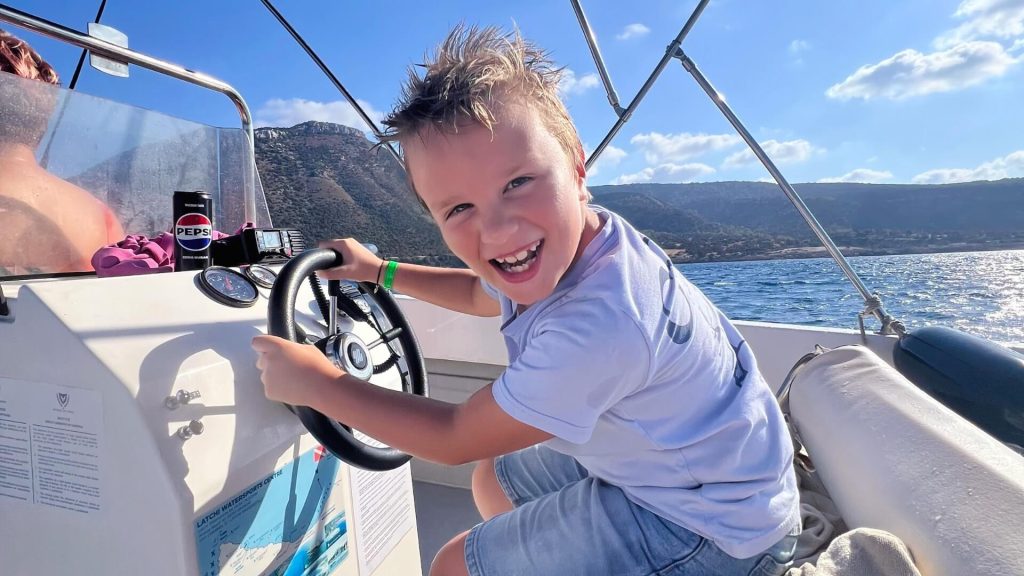
This Isn’t Luxury. It’s Survival.
At one point, we looked at each other and said, “This is such a luxury.”But the truth is, it’s not. It shouldn’t be.
What we experienced on the “good” holiday, the one with more softness, more space, more opt-out options, wasn’t a luxury. It was the baseline of what our family needs to stay regulated, connected, and sane.
This isn’t about indulgence. This is about survival.ND families are constantly sold ease but ease, for who? If it comes wrapped in forced timelines, crowded spaces, and ambient pressure to perform, is it really ease?
What we need is:
- Control over how and when we engage
- Food that’s available without fanfare
- Spaces where you can decompress without apologising
- The option to say no without anyone trying to change your mind
- A little space between us and the noise
And honestly? Sometimes we just need a break from needing to fit in even while on holiday.
What We’re Holding Onto For Next Time
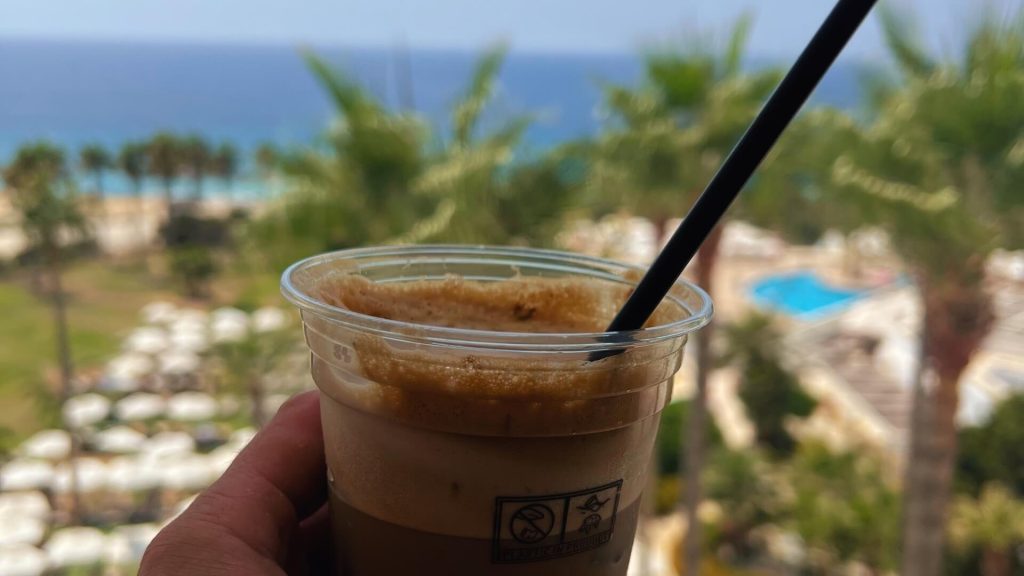
We’re not sharing tips. We’re not offering a checklist. We’re collecting clues. So far, this is what’s helping:
- Hotels where the entertainment doesn’t leak into the bedrooms
- Layouts that separate chaos from rest
- Rooms that feel like safe caves, not holding pens
- Food that’s not fancy, but easy
- One adventure, not ten
- Always rent the car
- Assume you’ll do less than you think and you’ll probably get more
We’re not bad at holidays. We’re just not built for the ones that ask you to perform relaxation.
Our best days look like this: A little bit of sunshine. A little bit of novelty. Someone getting to say no. Chocolate fountains. A boat. A sand dune. A new inside joke.
Final Truth
You’re allowed to want different things from travel.
You’re allowed to reject rigid schedules and theme nights and forced fun.
You’re allowed to say: “We spent 3 hours in the hotel room today and it was perfect.”
If you find a place that lets you rest, stim, melt down, laugh, snack, and opt out without judgment, tell us.
We’re building a list.
And who knows?
Maybe one day, we’ll build the actual place.


 Privacy Matters: You can unsubscribe and opt out from our emails at any time. Your trust is our top priority.
Privacy Matters: You can unsubscribe and opt out from our emails at any time. Your trust is our top priority.